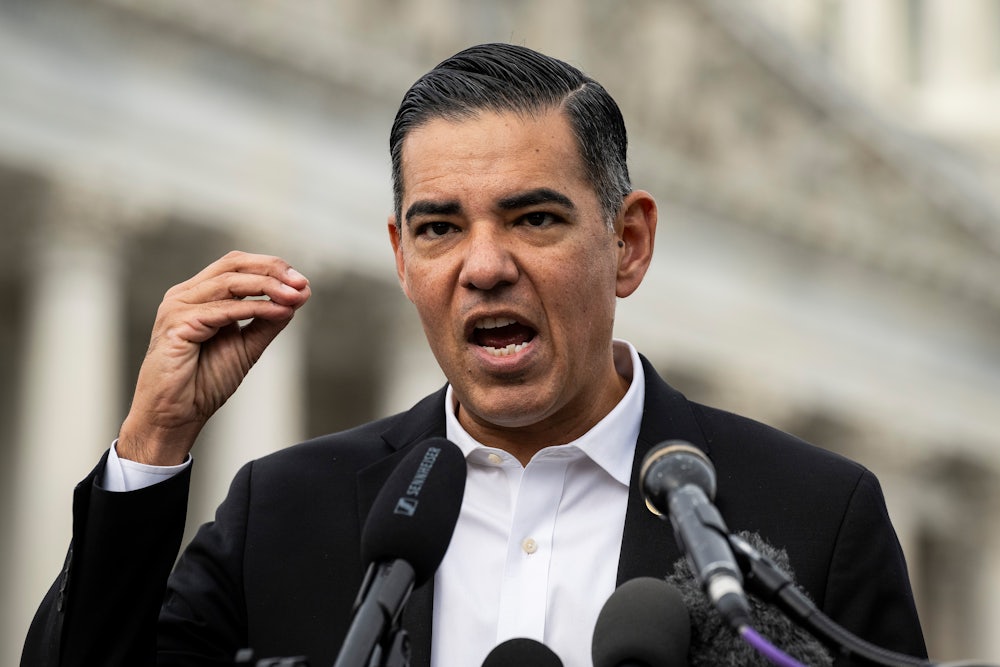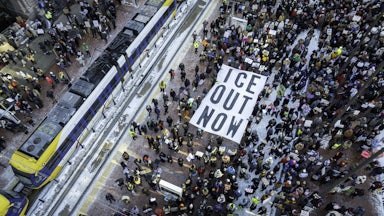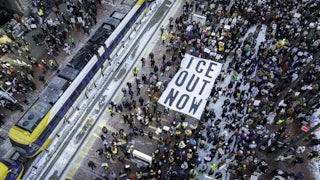It is typical for certain congressional hearings to garner the reputation of being media circuses. Often held in Washington by the various subcommittees of Congress, the congressional hearing is a tool for Congress to conduct fact-finding missions and investigate problems in American government. It is one of the few venues in which we get to watch our elected leaders publicly hold people to account.
On rare occasions, however, the committee comes to the citizens. On Monday, November 24, Representative Robert Garcia, the ranking Democrat of the House Oversight Committee, along with Los Angeles Mayor Karen Bass, Democratic members of the House Oversight Committee, and Los Angeles members of Congress, announced the first of several congressional field hearings in Los Angeles to examine the unlawful detention of U.S. citizens and immigrants by federal immigration agents.
According to Sara Guerrero, press secretary to Garcia, “The hearing will bring together city leaders, immigration advocates, and federal officials, and will feature firsthand testimonies from individuals who have been impacted by federal immigration enforcement actions, including U.S. citizens who were wrongfully detained by ICE. The congressional hearing is scheduled to be held as indiscriminate raids continue in Los Angeles and across the country.”
The hearings originated from an October 20 joint letter to Department of Homeland Security Secretary Kristi Noem penned by Garcia and Senator Richard Blumenthal. Written in response to ProPublica’s report of 170 cases of U.S. citizens detained by U.S. Immigrations and Customs Enforcement, the letter promised investigative hearings into cases of abuses and racial profiling of U.S. citizens of Latino ancestry by agents of ICE and Border Patrol.
The same day, Garcia and Los Angeles Mayor Karen Bass announced at their first joint press conference that the city would host hearings to investigate DHS operations in California from the previous summer. Alongside the L.A. hearing, Blumenthal announced that the Senate Permanent Subcommittee on Investigations would hold parallel investigations. Throughout this run-up, Garcia has demonstrated a particularly masterful understanding of the media. (According to Politico, it was Garcia who, in September, publicized the notorious doodle of a nude woman by Donald Trump that he gifted to Jeffrey Epstein.)
Garcia’s announcement offered a refreshing perspective on a Congress that has seemed to shirk its constitutional duties. Along with the Supreme Court, which has deferred to the policies of the Trump administration, Congress has done little to check the executive branch and reinforce the rule of law. Since Donald Trump took office in January, the Republican majority in Congress has gradually defaulted to the judgment of the Trump administration on the handling of government policy. In policies ranging from spending cuts for programs with preapproved budgets by Congress to tariff policy, the Trump administration has gone out of its way to bypass Congress. And, in the case of the shutdown, Senate Democrats dropped the ball in accepting a shaky promise from Senate Republicans to save Affordable Care Act tax credits.
One way that Democrats in Congress can redeem themselves is by conducting investigative hearings—a part of the stated duties of Congress and a tool for rooting out corruption. At a time when the Trump administration has committed countless acts of political corruption, ranging from awarding contracts to friends to persecuting political opponents, Congress can use the investigative hearing strategically to raise awareness to policy failures of the administration.
In the realm of immigration policy, the Republican majority in Congress has bowed toward the Trump administration’s mandate for mass deportations. In passing the Big “Beautiful” Bill, Congress earmarked $170.7 billion for the Department of Homeland Security’s immigration operations. Because Congress earmarked DHS’s pay bump via reconciliation instead of the regular appropriation process, the funds do not include directives on how the funds should be spent. As a result, congressional oversight of the funding is limited, and DHS has total discretion over the use of these funds. Several billions are earmarked for compensating local governments cooperating with ICE and Customs and Border Patrol in immigration operations.
What will likely happen, then, is that DHS will employ contractors to conduct work, including the construction of detention facilities. Already, several major instances of contractors working with DHS on immigration projects have garnered media attention.
On July 22, Bloomberg News reported that a relatively unknown building contractor in Virginia, Acquisition Logistics Company, received $1.26 billion in funding from the Trump administration to erect what it called “the biggest immigration detention center in the U.S.” at Fort Bliss, Texas. More recently, ProPublica reported that the Strategy Group, a public media company, has received a significant amount of DHS’s $200 million budget for ads. The Strategy Group has deep connections with Kristi Noem and staff members of the Department of Homeland Security, such as its CEO being married to DHS spokesperson Tricia McLaughlin, raising concern that these contracts violate ethical rules.
The late Michigan Senator Carl Levin co-authored with Elise Bean, former chief counsel on the Senate Permanent Subcommittee on Investigations, a comprehensive study on the importance of congressional hearings for the Wayne Law Review in 2018. “If Congress wants to meet its Constitutional responsibility to provide checks and balances to the rest of government,” argued Levin and Bean, “it needs to screen nominations made by the president, examine federal agency actions, and evaluate the judiciary.… It needs to investigate.”
Congressional investigations, while as old as Congress itself, became famous for spotlighting cases of political corruption. As Levin and Bean noted, the Teapot Dome corruption scandal put congressional investigations in the spotlight, when Senator Robert LaFollette led the charge of investigating the bribing of Secretary of Interior Albert Fall and Attorney General Harry Daugherty.
The Teapot Dome scandal became famous not only for the spectacle of Albert Fall’s demise, but also because of the Supreme Court cases that legitimized the power of Congress to investigate. In 1924, the Supreme Court ruled in McGrain v. Mally Daugherty that Congress not only had the right to investigate its sister branches, it also had the power to call witnesses and obtain testimony. In this case, the court upheld the conviction of Mally Daugherty, the brother of Attorney General Harry Daugherty, for contempt of Congress for refusing to appear before the committee, writing, “The power of inquiry—with process to enforce it—it is an essential and appropriate auxiliary to the legislative function.”
Likewise, in Sinclair v. United States, the Supreme Court ruled in 1929 that Harry Sinclair, the oil magnate who, alongside Thomas Doheny, bribed Fall for control of the Teapot Dome and Elk Hill oil leases, needed to testify before Congress and was justly held in contempt of Congress.
Since the Teapot Dome scandal, the hearing has been Congress’s tool for investigating political corruption, being used to break open the Watergate scandal in 1973 and the Iran-Contra scandal of 1987.
That doesn’t mean that congressional hearings have been universally productive; some are little more than empty spectacles for media consumption instead of a venue for investigative work. The McCarthy hearings of the 1950s and the work of the House Un-American Activities Committee, or HUAC, which skillfully manipulated the media to create a climate of paranoia, remain the textbook example of how hearings can devolve into political circuses. The late political scientist John C. Grabow wrote in his incisive study Congressional Investigations: Law and Practice that HUAC relied too much on the spectacle of persecuting individuals to produce any meaningful results. HUAC died with a whimper in 1975, yet the witch hunts it generated, along with the callous attacks on individual loyalty and character, are a legacy we live with today.
In recent years, congressional hearings have developed a negative reputation among political scientists. David Dayen of The American Prospect pointed out in his 2021 article “Why congressional hearings are bad, and how they can be made great again” how congressional hearings over the past decade have become increasingly melodramatic while missing the opportunity to provide genuine change. From 1930 to 1990, as Dayen argues, several hearings by notable political figures from Harry Truman and Frank Church in the Senate to Henry Waxman in the House used the power of the hearing to tackle corporate power. “Though some used different techniques, these lawmakers were all dedicated to understanding problems in society, and spending as long as necessary to seek the truth. They generated original information that could inform public policy.”
Now, according to Dayen, the role of the hearing has become less pertinent as members of Congress lose focus on their main purpose. In his view, “Few members have a coherent philosophy about the purpose of congressional hearings and oversight, so much so that when one of them offers a respectable response, it’s bracing.”
Not all recent hearings, arguably, have been a loss. The April 2018 Senate hearings into Facebook’s relationship with Cambridge Analytica exposed to the public how the Silicon Valley titan unjustly sold the personal information of users. Although little change came about as a result of the inquiry, it raised further public awareness of the privacy issues associated with social media. But in general, many hearings have garnered attention from the press in cases when they devolve into shouting matches, as was the case when Senator Markwayne Mullin of Oklahoma challenged Teamsters Union leader Sean O’Brien to a fistfight mid-hearing, which was broken up by Senator Bernie Sanders.
Congress has been active in the realm of oversight over ICE and CBP. On May 14, 2025, the House Appropriations Committee held hearings about budget requests by ICE during the 2025 fiscal year. Testifying before the committee, acting director Todd Lyons made his case for expanding ICE’s budget.
Representative Lauren Underwood of Illinois used the hearings as an opportunity to question Lyons about attacks on members of Congress who attempted to inspect ICE detention centers, such as Senator Alex Padilla of California and Representative LaMonica McIver of New Jersey. Representative Underwood reminded Lyons that members of Congress have the right to conduct unannounced inspections of detention facilities, per the Appropriations Act of 2019. In response, Lyons simply stated he was aware of the directive in the Appropriations Act of 2019. Underwood also asked about seven deaths that occurred in ICE facilities and the lack of transparency. Lyons confirmed that nine individuals have died in the past year in ICE facilities.
More controversial were the House Judiciary Subcommittee on Oversight hearings held on May 19. Those hearings garnered attention after the Department of Justice brought criminal charges against Representative LaMonica McIver for her presence at a May 9 protest outside the opening of the Delancey Hall detention facility in Newark. McIver, who attempted to inspect the facility, was charged by the Department of Justice with obstruction of federal agents. On November 13, a federal judge declined a request by McIver’s attorney to throw out the charges.
For a city that has been in the political spotlight throughout the year, Los Angeles has witnessed a great deal. I asked Los Angeles Times columnist Gustavo Arellano about what the hearings will mean for the city: “The hearings won’t do much to stop the raids, sadly,” says Arellano, “but it’ll be an opportunity to at least enter into the historical record what is happening.” Most of all, says Arellano, the hearings underscore how the city has become the target of political attacks: “These hearings are coming in the wake of a Senate hearing on the Palisades fire run by GOP senators who are using the pain of survivors to hurl partisan attacks at California and L.A.’s blue leadership. You’ll hear the opposite at the immigration hearings today. Sadly, L.A. can’t recuperate in peace without partisanship infecting the grieving process.”
In the long term, these hearings offer an excellent starting point for documenting the civil rights abuses by CBP and ICE agents during operations in Los Angeles. Having the hearing held at the site of immigration sweeps, instead of at the Capitol, would offer greater press coverage and encourage witnesses to testify. As several hearings have been held in Congress to discuss the conduct of ICE and CBP, holding hearings in the cities in question would offer a means for raising awareness among local communities.
The Los Angeles hearings could also offer a blueprint for future forums in other cities affected by ICE and CBP sweeps, such as Chicago, which is now reeling from a monthlong operation in the city. Now, in Charlotte, the city’s community is on edge as the Border Patrol deploys agents to conduct sweeps through the city. The Charlotte Observer reported that at some schools, parents are conducting lookouts for immigration officials hoping to detain children.
Offering hearings in different states would also offer opportunities to investigate operations in non-sanctuary states. One concern is the growing partnership between ICE agents and local law enforcement. The 287(g) program, which was enacted as part of the Illegal Immigration Reform and Immigrant Responsibility Act of 1996, allows for local law enforcement to enter into agreements with ICE. The partnership grants local law enforcement the power to detain individuals suspected of being undocumented, and has been pilloried by civil rights organizations such as the ACLU.
In its 2022 report about the 287(g) program, the ACLU concluded that the program used “anti-immigrant hate as its selling point.” The First Trump administration aggressively expanded the program to hundreds of local sheriff and police departments, with agreements remaining under the Biden administration. The ACLU concluded that over 65 percent of 287(g) participating agencies had lengthy records of civil rights abuses, and 77 percent of partner agencies maintained inhumane detention facilities.
The Trump administration has argued that a criminal element exists among undocumented immigrants. The rhetoric goes that if an undocumented immigrant crosses a border or port of entry illegally, they therefore must be capable of other criminal activity. As the ACLU rightly pointed out, the right’s labeling of undocumented immigrants as criminals engages in xenophobic fearmongering rather than sound law enforcement. Undocumented immigrants are not in violation of federal criminal law. And, as I reported previously, the Trump administration has stripped away the avenues by which immigrants and refugees can reside legally in the U.S., thus restricting new immigrants and criminalizing existing ones.
For Democrats in Congress still reeling from the shutdown, Robert Garcia’s proposed hearings might be the refresher the party needs to boost its political fortunes, exercise its oversight muscles, and rediscover its passion for prosecuting Trump’s misdeeds. At a time when the courts have provided few constitutional guardrails for the Trump administration, a hearing or two may be the way to respond to civil rights abuses and corruption within the administration.










